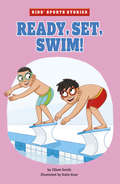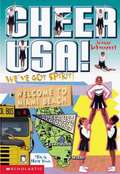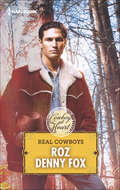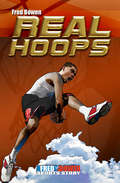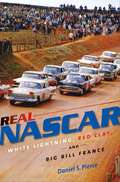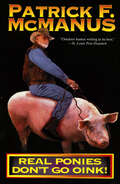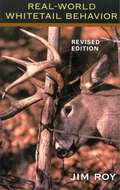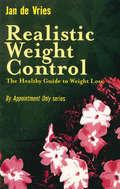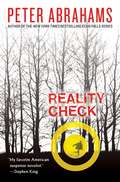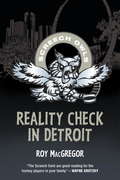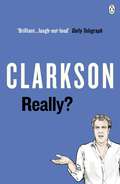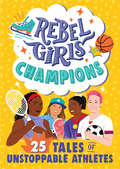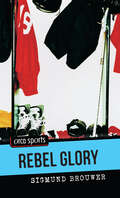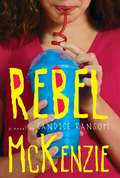- Table View
- List View
Ready, Aim, Fire!: The Real Adventures of Annie Oakley
by Ellen LevineThis book is a biography of the famous sharpshooter who toured the country in Buffalo Bill's Wild West Show.
Ready, Freddy! Don't Sit on My Lunch!
by Abby KleinFreddy is back for a new adventure. This time, Freddy would like to join the hockey team with his friend Jessie. But will a bully stand in his way?
Ready, Freddy! Ready, Set, Snow! (Ready, Freddy! #16)
by Abby KleinEverybody knows shark expert Freddy Thresher is also a snowshoe whiz or is he? When Mrs. Wushy announces that the class will be competing in the mini-Winter Olympics, everyone is excited for the competition. <P><P>But, after betting Max the bully that he will win the snowshoe race, Freddy heads straight for snowshoe boot camp, and fast! <P>Will Freddy be able to win gold amid sled pulls and the infamous Snowball Toss?
Ready, Freddy! Yikes! Bikes! (Ready, Freddy! #7)
by Abby KleinMeet the new kid on the block! It's Freddy Thresher, a first grader with a nose for trouble. It's not that he's trying to do anything bad. It's just that he's a boy who gets a little too creative and inventive when he has a problem.
Ready, Set, Go!: An Acorn Book (Moby Shinobi and Toby Too! #3)
by Luke FlowersMoby Shinobi and his sidekick Toby head to the racetrack, in this action-packed, rhyming early reader from New York Times bestselling illustrator, Luke Flowers!Pick a book. Grow a Reader!This series is part of Scholastic's early reader line, Acorn, aimed at children who are learning to read. With easy-to-read text, a short-story format, plenty of humor, and full-color artwork on every page, these books will boost reading confidence and fluency. Acorn books plant a love of reading and help readers grow!Moby Shinobi and his dog Toby are heading to the racetrack! Moby tries to use his ninja skills to help the crew, but ends up in a mess of oil spills, flat tires, and wrong turns. With some help from Toby, Moby discovers that teamwork makes every job easier! With easy-to-read rhyming text and full-color artwork throughout, this early reader series from New York Times bestselling illustrator Luke Flowers is sure to be a hit with beginning readers!
Ready, Set, Run!: The Amazing New York City Marathon
by Leslie KimmelmanA lively nonfiction picture book about runners preparing for, and racing in, the New York City Marathon, perfect for fans of Balloons Over Broadway and The Philharmonic Gets Dressed.All over the world—on city roads and country lanes, on beaches, high in the mountains, across fields, in sun, rain, and late at night, people get ready to race. It&’s a BIG DEAL to run in the New York City Marathon! In this energetic and ever-so-fun nonfiction picture book about the world's most famous race, readers follow runners from all over the world as they stretch, make their playlist, eat a spaghetti dinner, and then pound, pound, pound through the five boroughs of New York City, all the way to the finish line. With fun facts throughout ("Since 1979, a high school band stationed at Mile 9 plays the &“Rocky&” theme song again and again until the last runners go by"), this is an exhilarating, inside-view of what it entails to run the world's largest marathon.
Ready, Set, Swim! (Kids' Sports Stories)
by Elliott SmithSibling rivalry gets even more intense when twins are involved! Brothers and swim teammates Ty and Tristan have always tried to one-up the other, especially in the pool. When their competitiveness threatens to cost the team the big relay race, the swimming twins need to rethink, reset, and work together to bring home the win.
Ready, Shoot, Score! (Cheer USA #3)
by Jeanne BetancourtIt's time for the Regional Cheer USA competition in Miami -- and the girls on the squad are nervous. Melody is psyched to see her old friends, but doesn't know how they will get along with her new friends. And Emily and Joan have problems of their own.
Ready. Set. Respawn! (Minecraft Ironsword Academy)
by Caleb Zane HuettEmbark on a thrilling new adventure set in the world of Minecraft, where danger lurks at every turn, and our heroes must protect the Minecraft server from being shut down forever. Don&’t miss this action-packed chapter book series perfect for readers 6 to 9 and Minecraft fans of all ages!Following the events of The Minecraft Woodsword Chronicle and The Minecraft Stonesword Saga series, the Evoker King has evolved into the Evoker Kid, a total noob who wants to experience everything the world of Minecraft has to offer. Unfortunately, he walks into danger at every turn, so it&’s up to Morgan, Harper, and their friends to keep him safe. But even more unfortunately in the real world, they&’ve all been sent Ironsword Academy Middle School for the remainder of the school year. Now they&’re all noobs who will have to navigate the strange new school&’s hallways, try to make friends with new kids, and avoid a principal who would like nothing better than to shut down their video game time. Can they get the Evoker Kid to a safe destination before someone pulls the plug on their Minecraft server . . . permanently?!Find out in the only official chapter book series—based on the most popular video game of all time—that takes a group of intrepid Minecraft player on amazing journeys where they solve problems and unravel mysteries in the real world and in video game world.Don&’t Miss these other great Minecraft Series:• Minecraft Woodsword Chronicles books 1-6• Minecraft Stonesword Saga books 1-6© 2024 Mojang AB. All Rights Reserved. Minecraft, the Minecraft logo, the Mojang Studios logo and the Creeper logo are trademarks of the Microsoft group of companies.
Real Cowboys (Cowboy at Heart #27)
by Roz Denny FoxShe'd sworn to never love another cowboy...Taking a teaching job in a desolate corner of Idaho was Kate Steele's way of making sure her in-laws didn't turn her son, Danny, into a shiftless broncobuster like his father. Except in the middle of nowhere she unexpectedly ran headlong into a genuine buckaroo....Being a good parent and a born rancher were all that mattered to Ben Trueblood-until gutsy Kate Steele came along. Suddenly he found himself explaining to Danny that the rodeo circuit wasn't all that exciting...and considering the idea of hanging up his spurs.
Real Hoops (All-Star Sports Stories #16)
by Fred BowenCan street ball and technical play mix it up on the court and score wins for the team? Can Ben convince Hud to leave his hotshot style back on the pickup court?Ben and Logan are looking forward to basketball season playing on the Roosevelt High School freshman team. Ben figures he's a shoo-in to play shooting guard and Logan will be the team's center. But their perfect team still needs a perfect point guard.The two boys discover Antonio "Hud" Hudson at the local rec center, where fast-paced pickup games are the rule. Hud looks like just what the team needs--an instinctive passer with fancy moves. Even better, Hud is coming to Roosevelt!Roosevelt's tough coach has one rule for the boys: no pickup basketball. Later, when Ben finds Hud playing at the rec center--in violation of the rules--he has to make a decision. Does he turn Hud in, or does he keep his mouth shut? As captain, can Ben somehow help Hud balance his passion for the game and his dedication to the team?
Real NASCAR
by Daniel S. PierceIn this history of the stock car racing circuit known as NASCAR, Daniel Pierce offers a revealing new look at the sport from its postwar beginnings on Daytona Beach and Piedmont dirt tracks through the early 1970s when the sport spread beyond its southern roots and gained national recognition. Following NASCAR founder Big Bill France from his start as a mechanic, Real NASCAR details the sport's genesis as it has never been shown before. Pierce not only confirms the popular notion of NASCAR's origins in bootlegging, but also establishes beyond a doubt the close ties between organized racing and the illegal liquor industry, a story that readers will find both fascinating and controversial.Drawing on the memories of a variety of participants--including highly colorful characters like Lloyd Seay, Roy Hall, Gober Sosebee, Smokey Yunick, Bunky Knudsen, Humpy Wheeler, Bobby Isaac, Junior Johnson, and Big Bill France himself--Real NASCAR shows how the reputation for wildness of these racers-by-day and bootleggers-by-night drew throngs of spectators to the tracks in the 1930s, '40s, and '50s. They came to watch their heroes maneuver ordinary automobiles at incredible speed, beating and banging on each other, wrecking spectacularly, and fighting out their differences in the infield.Although France faced many challenges--including a fickle Detroit that often seemed unsure of its support for the sport, safety issues that killed star drivers and threatened its very existence, and drivers who twice tried to unionize to gain a bigger piece of the NASCAR pie--by the early 1970s France and his allies had laid a firm foundation for what has become today a billion-dollar industry and arguably the largest spectator sport in America.
Real Ponies Don't Go Oink!
by Patrick F. McManusA collection of humorous essays on bobcat encounters, birding, and other outdoorsmen misadventures from the Outdoor Life columnist hailed as “a treasure” (The Atlantic).“Bestselling outdoor humorist McManus bags another in this collection of yarns featuring irascible woodsman Rancid Crabtree, ‘Phantom of the Woods’ Retch Sweeney, boyhood pal Crazy Eddie, and others of McManus’s acquaintance. Also meet hunting dog Strange, dog delinquent, whose prey of choice is year-old roadkill. Readers of McManus’s humor column in Outdoor Life will enjoy his observations on the joys of pig-back riding, workshop puttering, and Sasquatch ducking. So will those who, like McManus’s wife Bun, appreciate nature most from the window of a seven-story luxury hotel.” —Library Journal“McManus is a brilliant humorist, particularly in describing human reactions to the unexpected . . . Certain pieces will appeal only to hunters and anglers, but other entries are so notable that the book deserves a wide audience.” —Publishers WeeklyPraise for Patrick F. McManus“Everybody should read Patrick McManus.” —The New York Times Book Review“A style that brings to mind Mark Twain, Art Buchwald, and Garrison Keillor.” —People“Describing Patrick F. McManus as an outdoor humorist is like saying Mark Twain wrote books about small boys . . . the funniest writer around today—indoors or outdoors.” —The Atlanta Journal-Constitution
Real World Whitetail Behavior
by Jim RoyTaking the controversial approach that deer hunting has become more of a "social event" than an affirmation of the more basic human need to subsist in the wild, Jim Roy proposes a simple, common sense method of stalking the whitetail that he calls "survival hunting." Some of the mysteries and myths concerning the whitetail can best be unraveled by observing the natural movements of the herd-not the more unnatural movements caused by pressure from humans or dogs. Roy breaks the deer herd down into its natural family groups, such as parental does with fawns, lone bucks, and single does of various ages, tracking their movements to and from their bedding areas based on such natural influences as wind direction and angle of sunlight. Based on over twenty years of observation at the Smithsonian Institute's Environmental Research Center on Chesapeake Bay, this revised edition of a classic will be welcomed by hunters and wildlife watchers alike.
Realistic Weight Control: The Healthy Guide to Weight Loss
by Jan de VriesWhatever you might call it - being overweight or corpulent or carrying excess fat - one thing is certain: obesity is one of the major problems of the developed world today. It is not simply a matter of being too fat: those who are severely overweight are prone to a tremendous range of other health problems such as back pain and coronary heart disease. In Realistic Weight Control Jan de Vries clearly and sensibly explains why these problems occur and how best to avoid them. Moreover, in view of the overwhelming variety of slimming methods on the market, each claiming to be better than the last, he points out the dangers to health caused by following an inappropriate diet.
Reality Check
by Peter AbrahamsQB of the varsity football team. Passing grades in all his classes. Dating the hottest--and smartest--girl at school. Summer job paying more than minimum wage. Things in Cody's world seem to be going pretty well. Until, that is, his girlfriend, Clea, is sent off to boarding school across the country, and a torn ACL ends his high school football career. But bad things come in threes--or in Cody's case, sixes and twelves--and the worst is yet to come. While limping through town one day, Cody sees a newspaper heading: "Local Girl Missing." Clea, now his ex, has disappeared from her boarding school in Vermont, and the only clue is a letter she sent to Cody the morning of her disappearance. With that as his guide, Cody sets out to find out what happened. Once in Vermont, he unearths the town's secrets--and finds out that football isn't the only thing he's good at. Reality Check is another edge-of-your-seat suspense novel by the New York Times bestselling and Edgar Award-nominated author of Down the Rabbit Hole.
Reality Check in Detroit
by Roy MacgregorThe Screech Owls are invited to compete in a four-day skills competition in Detroit. Along with another team, they will be participating in a reality show called Goals & Dreams. They're staying at a fancy hotel, being showered with hockey swag, given Hollywood nicknames, and posing for the film crew -- Hockeytown doesn't look bad at all! That's until they meet the other team and start noticing how differently they're being treated. Are the producers engineering certain tensions and situations to pump up the show? The Screech Owls don't like to be manipulated . . .
Really Wild Cycling: The pocket guide to off-the-beaten-track challenges (Wild Cycling Ser.)
by Chris SidwellsAn illustrated pocket guide to off-the-beaten-track cycling challengesReally Wild Cycling follows in the tracks of Chris's bestselling Wild Cycling. Most, if not all, the rides are off-road, but each one presents a challenge to inspire readers to train for it and have a go. Most take only a few hours, but some are longer, and a few much longer, taking even the fittest several days. An introduction explains safety techniques and underlines the skills, knowledge, equipment and fitness levels required. The rides are graded in ascending difficulty within each region. Each ride suggests regular escape points to get riders to a safe place should the weather close in and draws attention to places where extra care should be taken. Some rides are on marked routes, like the Trans-Pennine Trail, some are races or organised challenges, while others are routes the author himself has mapped out. Each ride is illustrated with photos, an annotated map and a profile of the terrain. The text includes a detailed route guide and historical, geological and natural points of interest.
Really Wild Cycling: The pocket guide to off-the-beaten-track challenges (Wild Cycling)
by Chris SidwellsAn illustrated pocket guide to off-the-beaten-track cycling challengesReally Wild Cycling follows in the tracks of Chris's bestselling Wild Cycling. Most, if not all, the rides are off-road, but each one presents a challenge to inspire readers to train for it and have a go. Most take only a few hours, but some are longer, and a few much longer, taking even the fittest several days. An introduction explains safety techniques and underlines the skills, knowledge, equipment and fitness levels required. The rides are graded in ascending difficulty within each region. Each ride suggests regular escape points to get riders to a safe place should the weather close in and draws attention to places where extra care should be taken. Some rides are on marked routes, like the Trans-Pennine Trail, some are races or organised challenges, while others are routes the author himself has mapped out. Each ride is illustrated with photos, an annotated map and a profile of the terrain. The text includes a detailed route guide and historical, geological and natural points of interest.
Really?: The World According To Clarkson
by Jeremy ClarksonJEREMY CLARKSON'S LATEST - AND MOST OUTRAGEOUS - TAKE ON THE WORLDCLARKSON'S BACK - AND THIS TIME HE'S PUTTING HIS FOOT DOWNFrom his first job as a travelling sales rep selling Paddington Bears to his latest wheeze as a gentleman farmer, Jeremy Clarkson's love of cars has just about kept him out of trouble.But in a persistently infuriating world, sometimes you have to race full-throttle at the speed-bumps.Because there's still plenty to get cross about, including:· Why nothing good ever came out of a meeting· Muesli's unmentionable side effects · Navigating London when every single road is being dug up at once· People who read online reviews of dishwashers· ****ing driverless carsBuckle up for a bumpy ride - you're holding the only book in history to require seatbelts . . .Praise for Jeremy Clarkson: Brilliant . . . Laugh-out-loud' Daily Telegraph'Outrageously funny . . . Will have you in stitches' Time Out 'Very funny . . . I cracked up laughing on the tube' Evening Standard
Rear View: A Fast-Paced, Thrilling Car Racing Romance
by K.C. HarperSpeed can be dangerous. Letting your past catch up with you is deadly. An ex-con bad boy is brought to his knees in K.C. Harper&’s contemporary debut, perfect for fans of Lauren Asher&’s Dirty Air series. Xavier Bosch has yet to find a rally-car course he can&’t handle—or a woman he wants to share the road with. He&’s worked hard to keep his criminal record a secret, but when the news breaks that his abusive father will soon be released from prison, his past threatens to catch up fast. Letting a woman into his world would only make her a target. But when a nasty crash brings Ryah Nolan into his life, all bets are off. Psychology student Ryah Nolan doesn&’t trust easy. Not with a professor determined to make her life hell, an ex-boyfriend who isn&’t quite an ex…and a terrifying stalker no one but her best friend takes seriously. Letting someone in is a risk. But despite his gruff exterior and need for speed, Xavier makes her feel safe. The closer Xavier and Ryah become, the more they want to put their pasts in the rear view. As they race the clock and the dangers they&’ve run from give chase, one thing is certain—they will win or lose together.
Rebel Girls Champions: 25 Tales of Unstoppable Athletes (Rebel Girls Minis)
by Ibtihaj Muhammad Rebel GirlsRebel Girls Champions: 25 Tales of Unstoppable Athletes celebrates the stories of 25 phenomenal women in sports all written in fairy tale form. It is part of the award-winning Good Night Stories for Rebel Girls series.This paperback collection showcases some of the most beloved stories from the first three volumes of the New York Times best-selling series Good Night Stories for Rebel Girls. It also features brand-new tales of game-changing athletes and their drive, resilience, and sportsmanship.In Rebel Girls Champions, young readers can win the World Cup with Megan Rapinoe, flip and tumble with Simone Biles, and land breathtaking snowboard tricks with Chloe Kim. Published directly after the Tokyo Olympics, Rebel Girls Champions includes the most thrilling anecdotes from the 2021 Games. The exciting, easy-to-read text is paired with colorful full-page portraits created by female artists from all around the world.
Rebel Glory: Rebel Glory (Orca Sports)
by Sigmund BrouwerAt 17, star defenseman Brian Thomas McPhee likes his chances of making it as a pro hockey player. Yet, a string of recent "accidents" threatens to knock his team out of the playoffs and ruin his promising career. B.T. McPhee has begun to question how many "accidents" can happen before they become more than a coincidence. But it's not a good time for questions. Not in the spotlight of high-pressure hockey. Not when the team needs him most. And not when he has some important lessons to learn about life. For B.T. McPhee, however, there is no choice. Unless the questions are answered, the team's season and his promising career will surely end.
Rebel In Right Field
by Duane DeckerBlue Sox 12. The ball shot on a sinking line over second base into right field, and Danny Redd watched it as he charged. It was a treacherous line drive, and it was his or nobody's. Danny saw that he should dive for it; instead he stretched his glove to his shoe tops. He felt the ball hit the glove, but he knew it had hit the turf a fraction of a second before. The umpire didn't see Danny trap the ball and called the play an out. Danny had apparently saved the inning, and he couldn't understand why manager Jug Slavin was angry about it. Danny Redd was the new right fielder for the Blue Sox, and he was on his way. He did everything right, but he wouldn't take a dive or crash into a fence for anyone. His older brother had finished his baseball career before it began by always getting hurt, and Danny wasn't going to make the same mistake. Great ballplayers aren't made that way, however, and how Danny slowly arrived at this painful conclusion is the climax of one of. Mr. Decker's finest baseball stories.
Rebel McKenzie
by Candice RansomWhen feisty twelve-year-old Rebel McKenzie, an aspiring paleontologist, goes to spend the summer taking care of her older sister's seven-year-old son at the mobile home park in Frog Level, Virginia, she never expects to enter a beauty pageant or meet a hand model.






